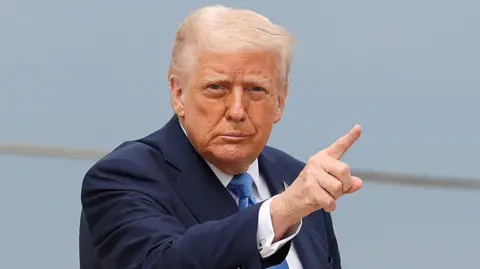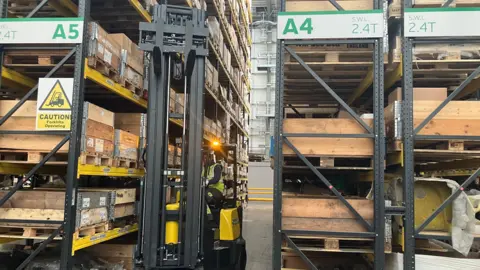Trump tariffs: Ireland expected to be among hardest hit
 Reuters
ReutersIreland is expected to be one of the most affected countries when President Trump announces a new round of tariffs later this week.
EU goods are expected to face a tariff of about 20% when entering the United States.
Among EU countries, Ireland is the most reliant on the US as an export market.
In 2024, Irish goods exports to the US were worth €73bn (£61bn), almost a third of the country's total exports.
Tariffs are effectively taxes applied to goods imported from other countries.
Governments impose tariffs in the hope of protecting local manufacturers from international competition.
The Taoiseach (Irish Prime Minister) Micheál Martin said on Monday that increased US tariffs were "a very grave and serious threat".
Analysis co-authored by Ireland's Department of Finance and the ESRI think tank suggested the tariffs could cost Ireland more than €18bn (£15bn) in lost trade.
It also warned that a prolonged trade war between the EU and US would pose a risk to Ireland's public finances.
Business impact of US tariffs
The level of concern in Ireland as the tariff's announcement draws closer can be gauged by the level of public interest in the issue.
Many Irish towns and cities have enjoyed the benefits of a US business presence for decades, while the workers who are employed in these big businesses travel to the plants from all over Ireland, meaning that the impact of any tariffs could reach into countless communities all over the country.

Monaghan-based manufacturer Combilift makes about a quarter of its sales in the US market where it also employs 50 people.
The company's co-founder and managing director Martin McVicar visited Chicago in March to brief his US customers.
He told them he will freeze the dollar price of all Combilift products this year to give them some certainty about import costs.
"We've given our customers certainty on what their costs will be in US dollars for products delivered to the port in the US.
"At least they can try to plan their business around that at this stage."

Mr McVicar remains bullish about the US market as he sees their products as helping customers run their businesses more efficiently.
Combilift makes forklifts which can operate in very tight spaces which allow companies to store more in their warehouses.
"We're enabling customers to expand without having to relocate and we're adamant that should outweigh the impact of a tariff," he said.
Pharmaceutical exports
Ireland's biggest export sector is pharmaceuticals: the country is a major manufacturing hub for US companies like Pfizer and Eli Lilly.
In 2024 overall exports of medical and pharmaceutical products rose by €22.4bn (£18.8bn) or 29% to just under €100bn (£83.7bn).
These products accounted for 45% of all Irish goods exports.
Trump has repeatedly expressed his unhappiness at the scale of US pharma manufacturing in Ireland.
Last month he said: "All of a sudden Ireland has our pharmaceutical companies, this beautiful island of five million people has got the entire US pharmaceutical industry in its grasp."
Trump has also talked about imposing specific tariffs on pharma, as he has done for imports of cars.
However that is not expected to form part of this immediate round of tariffs.
Analysis: John Campbell, BBC News NI economics and business editor
Ireland has been one of the winners of globalisation - that long process which has made it easier for people, goods and money to flow around the world.
Reforms to global tax rules over the last decade have been particularly beneficial.
That has led to major international pharmaceutical and technology companies paying a large chunk of their taxes in Ireland.
So much money has flowed in that the government has been able to set up a national wealth fund.
Donald Trump's deglobalising instincts are a clear threat to that prosperity.

Dan O'Brien, chief economist of the Institute of International and European Affairs, believes the Irish economy could be exposed because of the success of the pharmaceutical sector there.
"The republic is the single biggest exporter of pharmaceuticals to the United States. With a population of just over five million that makes it a bigger exporter than even the likes of traditional powerhouses like Germany and Switzerland," he said.
Mr O'Brien added the potential impact of the tariffs on Ireland could have parallels with the country's economic crash in 2008.
"Then there was a financial crisis, it was immediate, it was like the wind blew the roof off the house," he said.
"In this case it's more like a more gradual erosion of the foundations, which obviously is very important for any structure."
If the people of the country were not quite sure what the implication of the changes might be, the Irish government has left them in no doubt in recent weeks.
In a sobering analysis, the Minister for Finance, Pascal Donohoe, who is renowned for his cautious style of commentary around economic matters, outlined the possible outcome for Ireland in the worst-case scenario.
The minister, who is also president of the Eurogroup of Finance Ministers, said: "It is very possible that between 50,000 and 80,000 jobs that would have been created or kept within the economy won't be."
This sobering analysis has been accompanied by transatlantic and EU diplomatic discussions involving the Taoiseach Micheál Martin, and the Tánaiste (deputy PM) and Minister for Foreign Affairs, Simon Harris.
The scale of Ireland's dependency on foreign direction investment involving the US has been explained by Ireland's Industrial Development Authority (IDA).
An IDA spokesperson told BBC News NI: "IDA Ireland partners with more than 1,800 FDI client companies, 766 of which are US companies that directly employ over 210,000 people and indirectly support an additional 166,000 jobs.
"Conversely, Ireland is the sixth largest source of foreign direct investment into the US, with investment by Irish companies in 2023 worth $351bn (£272bn).
"More than 200,000 people are employed by 770 Irish companies across all 50 States."
